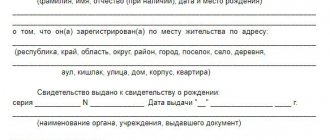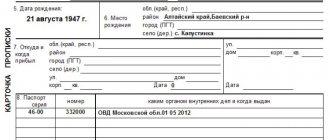According to current legislation, all citizens of the Russian Federation must be registered. This gives government agencies the opportunity to monitor the movement of citizens around the country, as well as track migration. Responsible for registering citizens is the Main Directorate for Migration Issues of the Main Directorate of Migration of the Ministry of Internal Affairs of the Russian Federation, which replaced the FMS reorganized in 2021.
Registration of citizens can be of 2 types - at the place of residence, which is not limited by a time frame and is permanent, and at the place of residence, which is issued for a period of 1 month to 5 years.
When registering temporarily at the place of stay, a person retains a permanent residence at the place of residence. Typically, temporary housing, as it is called, is registered by housing tenants, out-of-town students, migrants and business travelers.
It is issued upon check-in:
- to a rented apartment;
- to the hotel;
- dormitory;
- camping;
- a private house.
The rules for registering citizens change periodically. But over the past few years the procedure has not changed fundamentally.
Further in the article we will look at how registration at the place of residence is carried out in 2021 and what documents will be required for this.
Legislative aspect
The fact that you can travel freely throughout Russia is stated in the Constitution. Federal Law No. 5242-1 contains Article 1, which mentions that changing place, residence, and stay within the country is your legal right.
The Migration Legislation notes the importance of registering citizens who have changed their place of residence. Official recording of persons at their place of residence, both compatriots and foreigners, allows us to analyze:
- the situation on the employment market;
- population growth and decline;
- economic indicators of the region;
- state of the housing stock;
- need for educational institutions, etc.
What every foreign citizen should know can be found in the video below.
Article 3 of Federal Law 5242-1 states that registration of persons at the place of residence or stay is the responsibility of everyone, whether a citizen of the Russian Federation or a foreigner arriving in the country.
The consequences of ignoring Russian migration laws are discussed in Article 19.15 of the Code of Administrative Offenses of the Russian Federation.
Existing types of registration
According to Russian Legislation, there are 2 types of registration:
- constant;
- temporary.
The first has to do with a person’s place of residence, the second – with his place of stay. In the first case, we are talking about people staying in a certain living space for a long time. This is the official place of residence of the citizen.
This is what a certificate of temporary registration in Moscow looks like
The second is related to the ability of individuals, whether Russians or guests of the country, to exercise their rights. For example, a person can obtain a patent for a temporary address. This type of registration requires a citizen to remain in a certain region for more than 90 days.
Where can I register?
The Housing Code of the Russian Federation allows persons to carry out both types of registration in any type of residential premises. In this case, the word “residential” is key. You can record your location:
- in the apartment;
- in a house (residential);
- a certain part of a residential building;
- room;
- parts of the apartment, etc.
You can learn more about temporary registration in the video below.
When it comes to registration of a temporary nature, a citizen can register himself in the territory:
- medical institution;
- sanatorium;
- hotels;
- apartments, etc.
Both types of registration are allowed only on the condition that the legal owner of the area gives official consent to recording the location of citizens on its territory.
It is important to keep in mind that the tenant does not have any rights to claim ownership of the rental premises.
Upon receipt of housing, registration is made permanent
It is possible to register citizens at their place of residence without providing the consent of the owner when it comes to housing under the jurisdiction of the municipality. In this case, a contract for social rental of premises is concluded.
Registration in privatized housing
All owners and members of their families can register in privatized housing. The owner has the right to register his child who has not reached the age of majority. The procedure must be carried out in the presence of one of the parents. While discharge cannot be carried out without first obtaining the consent of the guardianship authorities.
Citizens can also be registered in houses included in dacha communities. In this case, the following conditions must be met:
- summer cottages are the only place where a citizen can live, otherwise he will receive the status of a homeless person;
- the dacha building is private property;
- the plot of land on which the object is located is located within the boundaries of a populated area;
- the building is officially recognized as residential.
You can learn more about the registration of a foreign citizen from the video.
If a citizen is registered at his place of residence in an area that is owned by a third party, it is necessary to provide written confirmation of the owner’s consent to the citizen’s registration. In some cases, migration authorities require the personal presence of the owner of the living space.
Registration at the place of residence – what is it?
Registration or registration is the determination of a citizen's place of residence with the corresponding entry in the passport. According to Law No. 5242-1 “On the right of citizens of the Russian Federation to freedom of movement,” every citizen has the right to freely choose his place of residence, but must obtain permanent or temporary registration when moving to a new place of residence
.
Place of residence is any real estate (house, apartment, room) where a person permanently or temporarily resides for a long time. In this case, it does not matter at all whether this living space is owned or rented. The main thing is to have official documents confirming the right to stay in the specified territory (Clause 1, Article 20 of the Civil Code of the Russian Federation).
To obtain the legal right to stay in the selected territory, permanent registration is issued. Whenever you change your permanent place of residence, you must obtain a note in your passport indicating the change of place of registration within 7 days.
. If violations in the procedure are discovered, you can receive a fine for this (Article 19.15. 1 and 15.2 of the Code of Administrative Offenses of the Russian Federation).
Note that there is a concept of temporary registration. It is issued if a person lives in the selected territory for a short time - up to 90 days (is on a business trip, works on a rotational basis).
Upon receipt of temporary registration, permanent registration is not canceled
. Information about temporary registration is provided on a separate form.
What is needed for permanent registration
The law not only talks about the obligation of citizens to register, but also provides for rules for registration at the place of residence. Let's start with the permanent registration process. Evidence that you have it is a special stamp that is placed on your identity card. Instead of a stamp, a special document may be issued certifying that you are permanently registered in such and such living space. It is important that this document has the seal of the Ministry of Internal Affairs.
Where can I register?
Recently, the list of places where a citizen (foreigner or Russian) can submit documents for registration has been expanded. This:
- Main Directorate for Migration of Territorial Importance;
- local passport office;
- MFC;
- State Services portal.
Unified portal of public services
As we see, now a person can not waste time on the process, doing it online.
What documents to submit
An important point is to collect the necessary papers. For permanent registration, the documentation package must contain:
- Application completed and signed by the applicant. For children under 14 years of age, filling out and signing is carried out by their legal representative. The application for registration at the place of residence and a sample form can be downloaded here.
- A passport that is not expired at the time of submission.
- Departure sheet. It is submitted in cases where the applicant, at the time of registration, made an extract from his previous place of residence.
- A paper confirming that the applicant has ownership rights to the living space where he is registering.
- Official consent of the owner or owners.
Certificate of departure from previous place of registration
The application form can be found on the Internet. This is form No. 6, which is suitable for both permanent and temporary registration.
What to provide for temporary registration
The package of documents provided for temporary registration is somewhat different. It should include:
- Statement. If it is drawn up for a minor citizen under 14 years of age, the child’s legal representative must fill it out and sign it. The application for temporary registration can be downloaded here.
- Applicant's identity card. This can be not only a passport, but also a foreign passport (for foreign citizens) and a birth certificate (for minors).
- The paper that serves as the basis for settlement. As such, the following may be provided: a certificate of registration of property rights, a lease contract, and the consent of the owner.
Sample of owner's consent for registration
Please note that regardless of the type of registration performed, this service is provided without charging a fee to the applicant.
More information about paying the state fee for registering a foreign citizen can be found on our website.
Permanent registration
When a person moves to another place (when buying a new apartment, for example, or during an exchange), he must register at the new address no later than a week after the move. Read about the features of registering for a new apartment here.
To do this you need to contact:
- at the MFC (read more about the registration procedure through the MFC here);
- to the passport officer of the housing cooperative, HOA or management company;
- to the passport office (former FMS office).
You need to have documents with you:
- passport (and birth certificates of children, if they also need to be registered);
- basis for registration (apartment certificate, social tenancy or rental agreement, application from the apartment owner);
- house book or apartment card (if necessary, check with the registrar).
Based on the documents in the registrar's form, an application and arrival sheets are filled out. After a maximum of 3 days, the registration procedure must be completed.
Result of registration:
- a stamp in the passport with a new address;
- certificate of registration of children under 14 years of age (read about registration of children under 14 years of age here).
The application can also be submitted online on the government services portal, but you will still need to come to the passport officer to sign the documents and put a stamp in the passport. In this case, all marks are made on the same day. We talked about how to register online on the government services portal here.
Now you don’t need to check out from your previous address; upon registration, the passport officer will automatically check you out.
What deadlines does the Law provide?
For some time, a person has the right to be outside the place in which he is registered without declaring this. Temporary and permanent redeployment have different deadlines.
Deadlines for deregistration from previous place of residence
As soon as the deregistration from the previous place of residence has been carried out, the person is given by law only 7 days to register again.
If a person does not change his registration, but stays in another locality for 90 days, he is obliged to declare his new location within this period.
If a foreigner or Russian is on the territory of a hotel, sanatorium and similar institutions, he should not worry about registration. This responsibility rests with the institution that settled it.
If we are talking about registering a foreigner who has just received Russian citizenship or a residence permit, the Law gives him no more than 7 days to register.
More information about the deadlines for registering a foreign citizen can be found in the video.
According to the legislation of the Russian Federation, temporary registration also has a period. It does not exceed 5 years. If you do not re-register after this period, penalties will be imposed on the violator.
What are the deadlines for registration?
After changing their place of residence, citizens are given some time to decide on their thoughts and submit documents to the Ministry of Internal Affairs. According to the law, after moving, a citizen has exactly three months to re-register officially.
After changing place of residence, a citizen is given three months to obtain registration
In most cases, registration on time is quite successful. However, sometimes it happens that homeowners are in no hurry to register new people in their living space (in particular, such situations can occur when drawing up a social tenancy agreement). The law provided for this shortcoming and eliminated it by introducing a fine for lack of registration not only for the citizen himself, but also for the owner.
Penalties
At the legislative level, several fines are established for lack of registration at the place of residence.
| Type of fine | Fine amounts |
| An administrative fine imposed on a citizen without registration | — 3000-5000 rubles for Muscovites and St. Petersburg residents; — 2000-3000 rubles for residents of other cities |
| Administrative fine imposed on property owners who are individuals | — 5000-7000 rubles for Muscovites and St. Petersburg residents; — 3000-5000 rubles for residents of other cities |
| Administrative fine imposed on property owners who are legal entities | — 300,000 – 800,000 rubles for Muscovites and St. Petersburg residents; — 50,000 – 760,000 rubles for residents of other cities |
When there is no fine
Of course, there are circumstances in which a person is not legally at his place of permanent registration for a long period of time. The imposition of a fine is not implied in the following situations:
- an unregistered citizen lives with the owner of the living space, who is a close relative (parent/spouse/brother or sister, etc.);
- a citizen is registered at one address, but lives at another - within the same locality. If the distance between the address at which an individual is registered and the place of his actual residence is small, no fine will be charged. Moreover, re-registration in such cases is not required at all;
- a citizen who has permanent registration on the territory of a subject of the Federation can freely move around it and stop at different points. For example, a resident of the Leningrad region has the right to buy an apartment in St. Petersburg and not go through the registration re-registration procedure.
When moving within the same city, registration does not need to be changed
Degree of responsibility of violators
If a person lives in a certain place for a long time without having a residence permit, according to the legislation of the Russian Federation, this is considered a violation, the punishment for which will be a fine. The size of the sanction depends on the city. If this is not a subject of federal significance, from 2 to 3 thousand rubles will be collected from the violator. If the offense was committed in cities such as Sevastopol, St. Petersburg or Moscow, the administrative penalty will be higher: from 3 to 5 thousand rubles.
Fines for violation
When it comes to temporary registration, carried out within 90 days, both the violators themselves and the owners of the residential areas in which they live are fined for ignoring migration norms. The former are charged from 2 thousand to 5 thousand rubles, from the latter – from 3 thousand to 5 thousand rubles. When it comes to populated areas of federal significance, the amount of the fine increases to sizes from 5 thousand to 7 thousand rubles.
For fictitious registration of foreign citizens, a fine of 100,000 to 500,000 rubles
The above sanctions apply to individuals. The question is different in relation to legal entities. More significant losses await them:
- 300–800 thousand rubles in cities of federal significance;
- 50–757 thousand rubles in other populated areas of the Russian Federation.
As such, the absence of registration marks and violation of its deadlines do not constitute criminal offenses. The offense is administrative in nature. However, if law enforcement agencies record such an offense as fictitious registration, it may entail punishment in the form of imprisonment or a heavier fine. For an individual, the amount will be 100-500 thousand rubles. A citizen can be imprisoned for a period of more than 3 years.
A citizen can also be fined for having permanent registration in the region where he lives at a temporary address.
Registration of citizens at the place of stay
The place of residence is the place where a citizen plans to stay for a fixed amount of time. These include:
- Hotel;
- Holiday home/boarding house/sanatorium;
- Camping;
- Tourist base;
- Medical organization;
- An institution that is part of the criminal executive system;
- Any other residential premises, except for the one that is the place of permanent residence of a citizen.
A person who has moved for the purpose of temporary residence must contact the responsible persons within 90 days and submit to them the following package of documents:
- Identification;
- Application for registration. It must be drawn up in accordance with the established form;
- A document giving the right to temporary residence in the relevant residential property (papers similar to those required for registration for permanent residence + an application from the person representing this property to the applicant).
If registration is carried out on the basis of a social tenancy agreement drawn up and concluded in full compliance with the Housing Code of the Russian Federation, the applicant may refuse to present these papers, limiting himself to indicating their details.
They should be specified in the registration application. He has the same right upon registration on the basis of a certificate of state registration of rights to a residential property.
In this situation, the registration authority will send a request to the appropriate authorities to obtain information regarding the documents specified above, after which it will register the applicant at the place of residence. This will happen no later than 8 working days from the date of submission of the registration application and identification card.
If the occupancy of housing occurred in the absence of a housing maintenance organization, the documents should be presented either to the citizen who is the owner of the premises or to a representative of the legal entity responsible for monitoring its operation.
How are persons without a place of residence registered?
The law of the Russian Federation provides for the registration of persons without a specific place of residence. This is stated in Article No. 27 of the Constitution, as well as in Government Resolution No. 688.
This is what a certificate of registration at the place of residence (temporary registration) looks like:
A citizen who does not have a permanent place of residence may be registered at the place of residence. You need to contact the above government services, in person or online. If the applicant does not have a passport, the basis for temporary registration will be his application drawn up in a special form.
The period for such registration is set individually, by agreement between the citizen and the authority that issued the certificate of registration at the place of residence.
Please note that in relation to the persons mentioned above, each region may have its own rules.
RULES FOR DEREGISTRATION IN THE RF
VIDEO ON THE TOPIC: Registration of citizens of the Russian Federation at the place of stay and place of residence within the Russian Federation
State service for registration of citizens of the Russian Federation at the place of stay and place of residence within the Russian Federation. Registration is established in order to provide the necessary conditions for citizens to exercise their rights and freedoms, as well as to fulfill their duties to other citizens, the state and society.
The registration authorities in cities, towns, rural settlements, closed military camps, as well as in settlements located in the border zone or closed administrative-territorial entities are the territorial bodies of the Ministry of Internal Affairs of Russia. Registration of citizens of the Russian Federation at the place of stay and place of residence within the Russian Federation is free of charge.
Place of stay - hotel, sanatorium, rest home, boarding house, camping, tourist base, medical organization or other similar institution, institution of the penal system executing punishments in the form of imprisonment or forced labor, or residential premises that are not the place of residence of a citizen of the Russian Federation where he resides temporarily. Place of residence - a residential building, apartment, room, residential premises of a specialized housing stock or other residential premises in which a citizen permanently or primarily resides as the owner, under a sublease agreement, a rental agreement for specialized residential premises or on other grounds provided for by the legislation of the Russian Federation , and in which he is registered at his place of residence.
The place of residence of a citizen belonging to the indigenous small people of the Russian Federation, leading a nomadic and or semi-nomadic lifestyle and not having a place where he permanently or primarily resides, in accordance with this Law, may be recognized as one of the settlements located in the municipal district, within the boundaries which the nomadic routes of a given citizen pass through. Citizens of the Russian Federation who have arrived for temporary residence in residential premises that are not their place of residence, or who have changed their place of residence, are required to contact the persons responsible for receiving and transferring documents to the registration authorities for registration and deregistration of citizens of the Russian Federation at the place of residence stay and place of residence within the Russian Federation.
Citizens also have the right to send applications for registration at the place of stay or place of residence to the registration authority in the form of an electronic document through the Unified Portal for the provision of state and municipal services or by mail only for registration at the place of stay.
Law of the Russian Federation No. The procedure for registration of minor citizens who have not reached the age of one year is regulated by paragraph 28 of the Rules for registration and deregistration of citizens of the Russian Federation at the place of stay and at the place of residence within the Russian Federation, approved by the Decree of the Government of the Russian Federation dated July 17.
Federal Law of November 15 If parents live separately, when choosing a child’s place of residence, they should be guided by the requirements of civil article 20 of the Civil Code of the Russian Federation and family article 65 of the RF IC legislation of the Russian Federation. In the event that the parents allowed the child to live without registration for more than the period established by the Rules, it must be borne in mind that the Code of the Russian Federation on Administrative Offenses provides for a fine for citizens in the amount of two thousand to three thousand rubles, for owners of residential premises - from two thousand to five thousand rubles; for legal entities - from two hundred and fifty thousand to seven hundred and fifty thousand rubles.
This violation, committed in a federal city of Moscow or St. Petersburg, entails the imposition of an administrative fine on citizens in the amount of three thousand to five thousand rubles; for tenants, owners of residential premises of individuals - from five thousand to seven thousand rubles; for legal entities - from three hundred thousand to eight hundred thousand rubles Art.
Regarding the residence of such a child without registration at the place of residence at the place of stay beyond the period established by the Rules, he is not subject to administrative liability, firstly, because he has not reached the age of summer, part 1 of article 2.
An application for registration at the place of stay and place of residence, as well as for deregistration at the place of stay and place of residence on behalf of citizens under the age of one year, is submitted by their legal representatives, parents and guardians.
Law of the Russian Federation of June 25 Registration of citizens at the place of residence is carried out without deregistration at the place of residence. Citizens who arrive for temporary residence in residential premises that are not their place of residence for a period of more than 90 days are required, before the expiration of the specified period, to contact the persons responsible for receiving and transferring documents to the registration authorities and submit: In the case of registration at the place of residence on the basis of a social tenancy agreement for residential premises concluded in accordance with the housing legislation of the Russian Federation, or a certificate of state registration of the right to residential premises, a citizen has the right not to present these documents, but only indicate in the application for registration at the place of residence their requisites.
In this case, the registration authority independently requests information from state bodies and local government bodies about such documents and registers the citizen at the place of residence.
Registration authorities register citizens at the place of stay in residential premises that are not their place of residence in the prescribed manner and issue them a certificate of registration at the place of stay. At the request of the citizen, a certificate of registration at the place of residence can be sent by the registration authority by mail to the address of the residential premises specified in the application for registration at the place of residence.
A citizen who has changed his place of residence is obliged, no later than 7 days from the date of arrival at his new place of residence, to contact the persons responsible for receiving and transferring documents to the registration authorities and submit:.
A citizen has the right not to present a document that is the basis for a citizen to move into a residential premises, a social tenancy agreement, a rental agreement for residential premises of a state or municipal housing stock, a state-registered agreement or other document expressing the content of a real estate transaction, a certificate of state registration of the right to residential property premises or other document, if the information contained in the relevant document is at the disposal of state bodies or local governments.
In this case, the registration authority independently requests from state bodies and local government bodies the relevant document for the information contained in it, an extract from the relevant register, and other information in accordance with the legislation of the Russian Federation and registers the citizen at the place of residence.
Registration of citizens of the Russian Federation at the place of residence at the place of stay in residential buildings located on garden and dacha land plots is possible. By the decisions of the Constitutional Court of the Russian Federation of April 14, taking into account the above decisions of the Constitutional Court of the Russian Federation, the decision to register at the place of residence of the owner and members of his family who do not have registration at the place of residence within the Russian Federation, in a residential building located on a garden plot of land , which relates to the lands of settlements or agricultural purposes, is adopted on the basis of a decision of the court or the authorized executive body of the constituent entity of the Russian Federation to recognize such a residential building as suitable for permanent residence of the owner and members of his family.
Registration is carried out by the migration departments of the territorial body of the Ministry of Internal Affairs of Russia at the district level. Registration of owners of residential buildings and members of their families is carried out upon receipt from them:. If the owner-tenant is ready to register at the place of stay or place of residence of a citizen living in a residential premises, but for some reason he refuses to register, then the owner-tenant of the residential premises after 90 days for registration at the place of stay and 7 days for registration at the place of residence is obliged to notify the registration authority within 3 working days about the citizen’s residence in the specified residential premises in the prescribed form in person, by mail or via the Internet, including through the Unified Portal of State Services.
In case of failure to notify the residence of such a citizen, the owner-tenant may be held administratively liable in accordance with parts 3 and 4 of the article. If notification is sent, then such administrative liability arises in relation to the citizen living without registration.
In the event that a citizen was promptly registered in a residential premises at the place of stay or place of residence, the owner or tenant of the residential premises does not need to notify the registration authority about the residence of such a citizen. Citizens are considered deregistered at the place of stay in residential premises that are not their place of residence upon expiration of the deadlines specified in their applications for registration at the place of stay.
Removal of a citizen from registration at the place of stay in hotels, sanatoriums, holiday homes, boarding houses, campsites, medical organizations, tourist centers or other similar institutions, institutions of the penal system executing punishments in the form of imprisonment or forced labor is carried out by the departure of such a citizen by the administration of the relevant institution.
In case of early departure of a citizen from a residential premises that is not his place of residence, this citizen or the person who provided him with residential premises for temporary residence, submits an application in any form to remove him from the registration register at the place of residence, indicating the date of departure if such date is known. or sends an application by mail or through the Unified Portal to the registration authority that carried out the registration at the place of residence of this citizen.
The owner-tenant of a residential premises, in the event of receiving a notification of registration at the place of residence of a citizen to whom he did not give consent for temporary residence, may submit an application in any form to cancel this citizen’s registration at the place of stay to the registration authority that carried out the registration at the place of residence of this citizen.
Removal of a citizen from registration at the place of residence is carried out by the registration authorities if the fact of fictitious registration of such a citizen at the place of stay in a residential building that is not his place of residence in which this citizen is registered is revealed - on the basis of a decision of the registration authority in the manner established Ministry of Internal Affairs of the Russian Federation. Removal of a citizen from registration at the place of residence is carried out by registration authorities in the following cases:
When submitting an application for registration at the place of residence to the registration authority by mail, the applicant simultaneously submits the following documents:.
If the citizen expresses his will, a completed certificate of registration at the place of stay is issued to him on reception days directly at the unit, or is sent by the registration authority by mail to the residential address indicated by the citizen in the application for registration at the place of stay.
The owner-tenant is sent a written notification of the completed registration at the place of stay of the citizen in his residential premises. The procedure for submitting an application, as well as other documents to the registration authority in the form of electronic documents through the Unified Portal is posted on the gosuslugi website. The Constitution of the Russian Federation was adopted by popular vote. Everyone who is legally present on the territory of the Russian Federation has the right to move freely, choose their place of stay and residence.
Article 1. The right to freedom of movement, choice of place of stay and residence within the Russian Federation.
In accordance with the Constitution of the Russian Federation and international human rights acts, every citizen of the Russian Federation has the right to freedom of movement, choice of place of stay and residence within the Russian Federation. Restrictions on the right of citizens of the Russian Federation to freedom of movement, choice of place of stay and residence within the Russian Federation are permitted only on the basis of law.
Persons who are not citizens of the Russian Federation and are legally located on its territory have the right to freedom of movement, choice of place of stay and residence within the Russian Federation in accordance with the Constitution and laws of the Russian Federation and international treaties of the Russian Federation. Article 3. Registration of citizens of the Russian Federation at the place of stay and place of residence within the Russian Federation.
In order to ensure the necessary conditions for a citizen of the Russian Federation to exercise his rights and freedoms, as well as to fulfill his duties to other citizens, the state and society, registration of citizens of the Russian Federation at the place of stay and at the place of residence within the Russian Federation is being introduced.
Citizens of the Russian Federation are required to register at their place of stay and place of residence within the Russian Federation. Registration or lack thereof cannot serve as a basis for restriction or a condition for the implementation of the rights and freedoms of citizens provided for by the Constitution of the Russian Federation, federal laws, constitutions, charters and laws of the constituent entities of the Russian Federation.
Article 5. Registration of a citizen of the Russian Federation at the place of stay and deregistration of a citizen of the Russian Federation at the place of stay.
Registration of a citizen of the Russian Federation at the place of residence is carried out within a period not exceeding 90 days from the date of arrival of the citizen in the residential premises. Registration at the place of residence is carried out without removing the citizen from registration at the place of residence. Article 6. Registration of a citizen of the Russian Federation at the place of residence.
A citizen of the Russian Federation who has changed his place of residence is obliged, no later than seven days from the date of arrival at his new place of residence, to contact the person responsible for receiving and transferring to the registration authorities documents for registration and deregistration of citizens of the Russian Federation at the place of stay and at the place of residence. residence within the Russian Federation, or to the registration authority with an application in the prescribed form.
The application, as well as the documents necessary for the provision of public services, can be submitted in the form of electronic documents and sent to the registration authority using public information and telecommunication networks, including the Internet, including the Unified Portal of State and Municipal Services. The registration authority is obliged to register a citizen at his place of residence no later than three days from the date of presentation of documents for submitting his application and documents in the form of electronic documents for registration.
Article 7. Removal of a citizen of the Russian Federation from registration at the place of residence. Removal of a citizen of the Russian Federation from registration at the place of residence is carried out by the registration authority in the following cases:. Article 8. Grounds for restricting the right of citizens of the Russian Federation to freedom of movement, choice of place of stay and residence within the Russian Federation. The right of citizens of the Russian Federation to freedom of movement, choice of place of stay and residence within the Russian Federation in accordance with the laws of the Russian Federation may be limited:.
Decree of the Government of the Russian Federation of July 17. The registration authorities in cities, towns, rural settlements, closed military camps, as well as in settlements located in the border zone or closed administrative-territorial entities are the territorial bodies of the Ministry of Internal Affairs of the Russian Federation .
Violation of the requirements of these Rules entails liability for citizens, tenants, owners of residential premises, officials and persons responsible for receiving and transferring documents to registration authorities, in accordance with the legislation of the Russian Federation. In this case, the registration authority independently requests from state bodies, local government bodies information about the documents specified in paragraph five of this paragraph, and registers the citizen at the place of residence no later than 8 working days from the date of submission of the application for registration at the place of residence and the document identification document in accordance with the legislation of the Russian Federation.
Registration authorities are obliged to register a citizen no later than 8 working days from the date the citizen submits an application for registration at the place of residence and other documents necessary for such registration in electronic form in the case provided for in paragraph eight of this paragraph. In this case, the registration authority independently requests from state bodies, local government bodies the relevant document for the information contained in it, an extract from the relevant register, other information in accordance with the legislation of the Russian Federation and registers the citizen at the place of residence no later than 8 working days from the date submitting an application for registration at the place of residence and an identity document in accordance with the legislation of the Russian Federation.
An application in the established form for registration at the place of residence in the form of an electronic document, as well as copies of the documents specified in this paragraph, in electronic form can be submitted through the Unified Portal of State and Municipal Services of Functions. If a citizen fails to submit an application in the prescribed form and other documents to the registration authority for registration at the place of stay or place of residence within the period established by the legislation of the Russian Federation, the tenant, the owner of the residential premises in which the citizen lives, after the expiration of the period established by the legislation of the Russian Federation, notifies within 3 working days, the registration authority confirms the citizen’s residence in the specified residential premises in the form according to the appendix.
The tenant, the owner of the residential premises, has the right to notify the registration authority about the period and place of residence of a citizen without registration in person, by mail or electronically using public information and telecommunication networks, including the Internet, including the Unified Portal. Violation of the deadline for notifying the registration authority about the residence of a citizen without registration entails the responsibility of the tenant of the owner of the residential premises in accordance with the legislation of the Russian Federation.
List of persons responsible for receiving and transmitting to the registration authorities documents for registration and deregistration of citizens of the Russian Federation at the place of stay and at the place of residence within the Russian Federation:. Order of the Ministry of Internal Affairs of Russia dated December 31
The public service is provided by the Ministry of Internal Affairs of the Russian Federation. Direct provision of public services is carried out by registration authorities. Persons responsible for receiving and transmitting documents to registration authorities, multifunctional centers in the presence of an appropriate agreement on interaction, and organizations of federal postal services take part in the provision of public services.
The grounds for refusal to accept an application for registration and documents necessary for the provision of public services are:. The basis for suspension of the provision of a public service is the failure of the applicant to appear within three calendar days after his invitation to an appointment with original documents, if the application for registration, application for deregistration at the place of residence or application for deregistration at the place of stay was submitted through the Unified portal.
Code of the Russian Federation on Administrative Offences, extract. Article Residence of a citizen of the Russian Federation at the place of stay or at the place of residence in a residential building without registration.
Residence of a citizen of the Russian Federation at the place of stay or place of residence in a residential premises without registration, or the admission of such residence by the tenant or owner of this residential premises beyond the time limits established by law -. The violation provided for in Part 1 of this article, committed in the federal city of Moscow or St. Petersburg, -. Citizens of the Russian Federation are exempt from administrative liability for an administrative offense provided for by this article in the following cases:
Violation of the rules for registering a citizen of the Russian Federation at the place of stay or place of residence in a residential area. Violation of the rules for registering a citizen of the Russian Federation at the place of stay or at the place of residence in a residential building, if these actions do not contain signs of a criminal offense, shall entail the imposition of an administrative fine on citizens in the amount of two thousand to three thousand rubles; for tenants, owners of residential premises of individuals - from two thousand to five thousand rubles; for officials - from twenty-five thousand to fifty thousand rubles; for legal entities - from two hundred and fifty thousand to seven hundred and fifty thousand rubles.
The violation provided for in Part 1 of this article, committed in the federal city of Moscow or St. Petersburg, entails the imposition of an administrative fine on citizens in the amount of three thousand to five thousand rubles; for tenants, owners of residential premises of individuals - from five thousand to seven thousand rubles; for officials - from thirty thousand to fifty thousand rubles; for legal entities - from three hundred thousand to eight hundred thousand rubles.
State service for registration of citizens of the Russian Federation at the place of stay and place of residence within the Russian Federation. Registration is established in order to provide the necessary conditions for citizens to exercise their rights and freedoms, as well as to fulfill their duties to other citizens, the state and society. The registration authorities in cities, towns, rural settlements, closed military camps, as well as in settlements located in the border zone or closed administrative-territorial entities are the territorial bodies of the Ministry of Internal Affairs of Russia.
These regulatory legal acts do not give the Russian Ministry of Foreign Affairs and consular offices of the Russian Federation the authority to remove Russian citizens abroad from registration at their place of residence in the Russian Federation. Also, such a statement in a foreign language can be drawn up by a local notary, after which an apostille must be affixed to it and the document must be translated into Russian. We recommend that you address questions about the need for the consulate to certify the translation of a document into Russian, as well as about the rules for sending documentation, to the Ministry of Internal Affairs at the place of registration. The addresses of the territorial bodies of the Ministry of Internal Affairs of Russia on the territory of the Russian Federation, as well as the list of necessary documents for deregistration of citizens are indicated on the website of the Ministry of Internal Affairs of Russia: MIA. In connection with the above, starting from the date of publication of this message on the Embassy’s website, the Consular Section of the Embassy of the Russian Federation stops accepting documents from citizens to deregister them on the territory of the Russian Federation. Home page.
Is it possible to register in a mortgaged apartment?
Applying for a mortgage loan comes with many challenges. When all the vicissitudes associated with lending are left behind, citizens living in mortgaged residential areas face new problems. Many of them relate to the question: is a mortgage an object without the right of residence or is it still possible to register in such a living space?
Watch the video: mistakes you should not make when getting a mortgage.
Russians are often confident that an apartment or house taken on credit will be available for registration only after full payment of all debts to the financial institution with which the contract was concluded. Is it so?
In fact, a mortgage is not an obstacle to registering in an apartment and registering other citizens in it. A citizen who purchases a house or apartment with borrowed funds will not be left without a place of residence. A Russian living in mortgaged housing signed not one, but two contracts:
- Purchase and sale.
- To receive a loan.
The basis for registration is the first document. It doesn't say anything about mortgages. Based on the foregoing, the borrower has the same owner rights as citizens who bought living space without concluding an agreement with the bank.
Sample contract for the purchase and sale of a house
Mortgage real estate has an encumbrance and associated restrictions, but this in no way makes the bank a co-owner. Restrictions may be associated with the inability to sell such living space or donate it. Otherwise, “the owner is the master.” Some restrictions may be associated with the ability to register relatives in such living space.
How to register in a mortgaged apartment
According to standard agreements concluded with banks, the borrower has every right to register himself in the purchased living space. The contract also gives him the right to register close relatives. These include:
- spouses;
- native children;
- adopted children.
The fact that you have the opportunity to register close relatives on the territory of the mortgaged property should be a separate clause stated in the contract.
It is possible to register third parties in an apartment or house taken on credit. The basis for it must be the official permission of the creditor’s administration. This document should be submitted to the passport office.
To find out more about how many people you can register, watch the video.
The registration procedure takes about a week. The process will go faster if the bank (some provide this opportunity) allows you to go through the process through its Internet resource.
You can also register a foreign citizen at the post office.
Practice shows that in most cases, the passport office does not register either relatives or third parties until a loan contract is provided that stipulates such an opportunity or a separate document from a financial institution giving the applicant such a right.
Documents for registration
Registration is carried out in accordance with an application in Form No. 6, to which are attached:
- ID card of a citizen of the Russian Federation;
- extract from previous place of residence;
- when registering a family: marriage certificate and birth certificates of minor children;
- a copy of the document confirming the right to property.
If registration is carried out by military personnel, a military ID is presented instead of a passport. Children over 14 years of age must appear at the passport office with their parents.
Sample certificate of ownership of real estate
Law on temporary registration
If a person leaves his home and settles in another place for longer than three months, then according to the law on temporary registration he is obliged to obtain temporary registration.
To do this, you need to contact your place of temporary registration:
- to the passport office (former FMS offices);
- to passport officers of HOAs, housing cooperatives, and management companies;
- to the multifunctional center.
You need to bring documents with you:
- passport (and birth certificates of children, if necessary to register them);
- basis for moving in (hire (sublease) agreement, lease, certificate of ownership or application from the owner of the property).
You can read more about the rules for temporary registration at your place of stay, and also download the necessary document forms here.
If a citizen registers in municipal housing, then it is necessary to obtain the consent of all residents there, including those who are temporarily absent (military personnel, prisoners or vacationers). You can find out more about registration in municipal housing in our material.
The registrar will issue an application form that you will need to fill out. Registration is a free procedure! The application can be sent by mail or completed online on the government services portal (registration required).
The period of temporary registration is not defined by law, that is, you can register temporarily for a week or for several years. With the expiration of the period, and it is indicated in the application, the registered person loses the right to use temporary housing. Read more about the validity period and registration of temporary registration in our article.
Typically, registration is completed on the day of application, but paragraph 12 of the Rules establishes a maximum period for the procedure - 3 business days from the date of receipt of the application. The result of registration is a certificate of temporary registration.
Nuances:
- the certificate can be received by mail, indicating such a wish in the application;
- children are registered with their parents regardless of the opinion of the owner of temporary housing;
- You don’t need to leave your apartment.
Read more about temporary registration for citizens of the Russian Federation and foreigners in this article, and how to carry out temporary registration for a foreigner via mail can be found here.
Can a bank prohibit registration on a mortgaged property?
The legislation does not indicate that a financial institution is obliged to allow a citizen to register in the housing space taken on credit. Some banks prohibit such actions on the part of the borrower in the contract. This is not a violation of the Law.
If you sign an agreement with a financial institution, do not sign until you carefully study the contract and make sure that you can register yourself, relatives and third parties in the new apartment or house. By acting in this way, you will protect yourself and avoid litigation, the decisions of which may not be in your favor.
Constant
Registration at the place of residence, which is required when moving to a new apartment or when leaving a previous home, is completed after contacting the same government agencies described above. The citizen registering must have a passport, as well as an apartment certificate or lease agreement, and a house register.
This is interesting: Is it possible to live at a location other than the place of registration? What is registration address and registration address?










